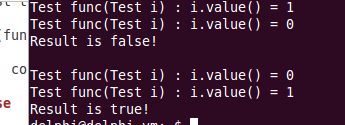第38课.逻辑操作符的陷阱
eg:
#include <iostream>
#include <string>
using namespace std;
class Test
{
int mValue;
public:
Test (int v)
{
mValue = v;
}
int value() const //因为重载的逻辑操作符的参数是const对象。const对象只能调用const函数。
{
return mValue;
}
};
bool operator && (const Test& l, const Test& r) //const对象
{
return l.value() && r.value();
}
bool operator || (const Test& l, const Test& r)
{
return l.value() || r.value();
}
Test func(Test i)
{
cout << "Test func(Test i) : i.value() = " << i.value() << endl;
return i;
}
int main()
{
Test t0(0);
Test t1(1);
if(func(0) && func(1)) //理论上:0 && 1 只执行func(0)。执行完后,短路。这句语句就结束了。但实际上fun(0)和func(1)都执行了???
{
cout << "Result is true!" << endl;
}
else
{
cout << "Result is false!" << endl;
}
cout << endl;
if( func(1) || func(0) ) //理论上:1 && 0 只执行func(1)。执行完后,短路。这句语句就结束了。但实际上fun(0)和func(1)都执行了???
cout << "Result is true!" << endl;
}
else
{
cout << "Result is false!" << endl;
}
return 0;
}

问题:为什么重载后会出现和理论上相互违背的事情呢?短路规则不在起作用?为什么先调用的后面的,在调用的前面的?
答案:
a.重载逻辑操作符的时候,需要将重载函数所需的两个参数传递个重载函数进行调用。而函数的参数在进入函数体前必须完成所有参数的计算。所有导致函数的短路法则不起作用。这样才有了上诉的func(0)和fun(1)两者都被调用的现象产生。
b.那为什么函数的参数的计算顺序是从右向左的呢?因为函数参数的计算顺序是不定的。这里只是碰巧编译决定了,他们是从右到左的。


 浙公网安备 33010602011771号
浙公网安备 33010602011771号